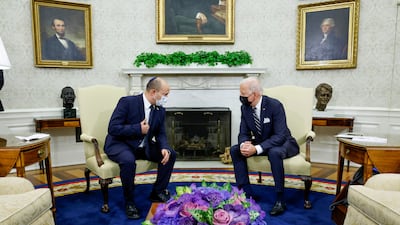Israel has always been the country most uncomfortable, and often loudly so, with US nuclear negotiations with Iran. So, it raised quite a few eyebrows last month when the new Israeli government formally led by Prime Minister Naftali Bennett, but effectively co-ordinated by Foreign Minister Yair Lapid, announced that Israel would not oppose a new US-Iranian understanding to revive the 2015 nuclear agreement.
There is both more and less to this apparent policy change by the new Israeli government than first meets the eye.
On the less side, Israel remains sceptical about the long-term viability of efforts to convince Iran to refrain voluntarily from one day going nuclear, particularly in the absence of a far stronger threat of military action from Washington.
On the more side, the reasons for this new restraint illustrate vividly how the new Israeli government differs from that of former prime minister Benjamin Netanyahu, and how attitudes in Israel and the US towards each other are evolving.

The new Israeli government is confronted with the fact that a long history of strident Israeli opposition to US-Iranian nuclear negotiations, not to mention the 2015 agreement, has done nothing to prevent Washington doing exactly what it wants regarding Tehran.
It is still fairly common for commentators in both the US and the Middle East to assert that the main US policy goal in the region is Israel's security, and that comes from both supporters and opponents of this alleged priority.
But, whether that conviction stems from excessive pride in that supposed policy, or passionate opposition to it, the fact is that it is perfectly clear that Israel retains no veto over US conduct in the Middle East or anywhere else. Washington's brushing aside of Israeli opposition, passionately expressed by Mr Netanyahu, when it came to the 2015 nuclear agreement is only the latest and one of the most dramatic illustrations of this.
Simply put, Israel does not have the level of influence in the US to prevent any potential understanding with Iran, including regarding nuclear weapons. So why would Mr Bennett and Mr Lapid waste energy and pick an unprofitable and pointless fight with President Joe Biden's administration and other Democrats when they have no realistic hope of restraining the Americans?
If anything, the fight would be politically counterproductive for the new government.
Mr Netanyahu made opposition to negotiations with Iran a cornerstone of his political profile and Israeli policy when he was in office. That played supremely well with his two main audiences – members and supporters of his own Likud party in Israel and hawkish Republicans and evangelical Christians in the US.
Even if he failed to prevent an agreement, and in the process angered many Democrats and other proponents of diplomacy with Tehran, he would benefit politically from vociferous complaining and critiquing the whole process.

His 2015 speech at a joint session of Congress, in which he effectively denounced the foreign policy of then president Barack Obama, was widely regarded as improper and even objectionable interference in domestic American politics by a foreign leader. And although diplomatically damaging to Israel, it was a considerable personal political success for him with his two primary target audiences.
The new Israeli coalition, an unlikely aggregation of extremely odd political bedfellows, cannot afford a major internal argument over US negotiations with Iran because that would very quickly expose the profound disagreements separating Mr Bennett from many of his cabinet colleagues, most of whom are dramatically to his political left.
So, from a political point of view, declining to get into a major argument in either the US or Israel, over this potential agreement that the Israelis couldn't stop anyway, is a no-brainer. It would be all-cost and no-benefit.
Finally, it would be particularly imprudent not to make it clear that this Israeli government isn't going to harass the Biden administration over a potential agreement with Iran because that is looking increasingly unlikely. Mr Biden was not able to come to terms with former president Hassan Rouhani, and there is no indication he is going to get more co-operation from the new hardline leader, Ebrahim Raisi.
American officials leading the negotiations remain determined to revive the 2015 agreement, but they are becoming increasingly pessimistic about the potential for a viable understanding with Iran.
Tehran's attitude appears to have hardened because the country, for all of its myriad difficulties, managed already to endure the worst blows from the "maximum pressure" sanctions campaign instituted by former US President Donald Trump and that has been largely maintained by Mr Biden. After terrible hardships suffered from 2019 to 2020, the Iranian economy has beefed up its internal markets and Iran has been able to sell oil to China and other customers.
For all of their impact, the sanctions did not bring Iran to its knees. Tehran seems to feel comfortable, therefore, with the prospect of simply saying no to Washington unless they get better terms. But that is not going to happen.
It is still the case that both the US and Iran say they want a renewed agreement and that this would be in the interests of both parties. But since both seem to believe they are operating from stronger positions than they actually have, and both seem intent on securing some gain from the other, it is becoming far easier to imagine the process ending without any substantive understanding.
So, for the Israelis, at this stage, categorically and openly opposing a potential new agreement would constitute picking a politically damaging fight, which they are likely to lose, over an agreement that is increasingly unlikely to actually be realised. That is not what you might call a difficult decision.


